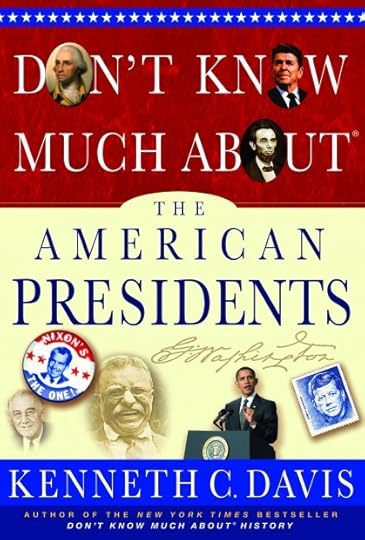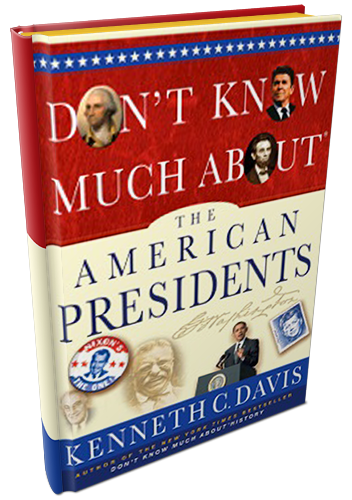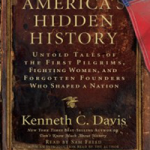Kenneth C. Davis's Blog, page 90
February 17, 2014
It is NOT Presidents Day. Or President’s Day. Or Even Presidents’ Day.
So What Day Is it After All?
Okay. We all do it. It’s printed on calendars and posted in bank windows. We mistakenly call the third Monday in February Presidents Day, in part because of all those commercials in which George Washington swings his legendary ax and “Rail-splitter” Abe Lincoln hoists his ax to chop down prices on everything from mattresses and linens to SUVs.
But, really it is George Washington’s Birthday –federally speaking that is.
The official designation of the federal holiday observed on the third Monday of February was, and still is, Washington’s Birthday.

I wrote My Project About Presidents in 3rd Grade when I was 9. Even then I was asking questions about history and presidents
But Washington’s Birthday has become widely known as Presidents Day (or President’s Day, or even Presidents’ Day). The popular usage and confusion resulted from the merging of what had been two widely celebrated Presidential birthdays in February –Lincoln’s on February 12th, which was never a federal holiday– and Washington’s on February 22.
Created under the Uniform Holiday Act of 1968, which gave us three-day weekend Monday holidays, the federal holiday on the third Monday in February is technically still Washington’s Birthday. But here’s the rub: the holiday can never land on Washington’s true birthday because the latest date it can fall is February 21, as it did in 2011.
There is a wealth of information the First President at Mount Vernon.

Washington’s Tomb — Mt. Vernon (Photo credit Kenneth C. Davis 2010)
Read More About the creation of the Presidency, Washington, his Life and administration in DON’T KNOW MUCH ABOUT® THE AMERICAN PRESIDENTS

January 31, 2014
Don’t Know Much About® “Connected Classrooms”
I have seen the future (of education). And it works. I think. Last week, I was “visiting” a school in Pennsylvania in which I spoke to and took questions from two hundred kids in the former library –all toting laptops and tablets.
Over the past few weeks, I have visited about a dozen classrooms in Pennsylvania, Alabama, Maryland and one of my favorites, Grapevine,Texas. I have been doing this from the comfort of my office using Skype to visit classrooms around the country –and even the world. Yes, I have been to Bratislava!
I have also begun to connect with an extraordinary group of teachers via Twitter using the hashtag #sschat, and other social media.
Welcoe to the “Connected Classroom.” This is not the classroom of my childhood –or probably yours. But is the classroom of today and tomorrow.
(US News and World Report has published a list of the “Best Connected Classrooms.”)
January 27, 2014
Sabbatical
I am currently completing a new book and have taken a brief “sabbatical” from my regular posts. I expect to resume my regular blog posts in the very near future.
Thanks for following and for your interest!
Watch for the paperback edition of Don’t Know Much About® the American Presidents, coming in April from Hyperion Books!

Don’t Know Much About® the American Presidents-now available in hardcover and eBook and audiobook
January 6, 2014
Who Said It? (1/6/14)
George Washington, “First Annual Message to Congress” (“State of the Union”), January 8, 1790.
Knowledge is in every country the surest basis of publick happiness

Nor am I less persuaded, that you will agree with me in opinion, that there is nothing which can better deserve your patronage, than the promotion of Science and Literature. Knowledge is in every country the surest basis of publick happiness. In one, in which the measures of government receive their impression so immediately from the sense of the community, as in our’s, it is proportionately essential. To the security of a free Constitution it contributes in various ways: By convincing those who are entrusted with the publick administration, that every valuable end of government is best answered by the enlightened confidence of the people: And by teaching the people themselves to know, and to value their own rights; to discern and provide against invasions of them; to distinguish between oppression and the necessary exercise of lawful authority; between burthens proceeding from a disregard to their convenience, and those resulting from the inevitable exigencies of society; to discriminate the spirit of liberty from that of licentiousness, cherishing the first, avoiding the last, and uniting a speedy, but temperate vigilance against encroachments, with an inviolable respect to the laws.
Complete Text: The Avalon Project- Yale Law School
President George Washington first established the practice of reporting to Congress once a year. Washington gave his first annual message—what is now known as the State of the Union—to Congress on January 8th, 1790. He addressed Congress in person in the Senate Chamber of Federal Hall in New York City (the temporary seat of government at that time).
December 23, 2013
Who Said It? (12/23/13)
“I urge the prompt enactment of legislation which will provide for primary elections throughout the country.”
Woodrow Wilson, “First Annual Message” (December 2, 1913)

Thomas Woodrow Wilson 28th POTUS(1918) Library of Congress Prints and Photographs Division Washington, D.C. 20540 USA
I turn to a subject which I hope can be handled promptly and without serious controversy of any kind. I mean the method of selecting nominees for the Presidency of the United States. I feel confident that I do not misinterpret the wishes or the expectations of the country when I urge the prompt enactment of legislation which will provide for primary elections throughout the country at which the voters of the several parties may choose their nominees for the Presidency without the intervention of nominating conventions. I venture the suggestion that this legislation should provide for the retention of party conventions, but only for the purpose of declaring and accepting the verdict of the primaries and formulating the platforms of the parties; and I suggest that these conventions should consist not of delegates chosen for this single purpose, but of the nominees for Congress, the nominees for vacant seats in the Senate of the United States, the Senators whose terms have not yet closed, the national committees, and the candidates for the Presidency themselves, in order that platforms may be framed by those responsible to the people for carrying them into effect.
Source: Woodrow Wilson: “First Annual Message,” December 2, 1913. Online by Gerhard Peters and John T. Woolley, The American Presidency Project. http://www.presidency.ucsb.edu/ws/?pid=29554.
Wilson’s first message to Congress was fairly unremarkable in what he said. But his method of delivery was significant. In 1913, Wilson delivered the annual “Message to Congress” –later known as the State of the Union address– in person. He was the first President to deliver the annual message in person since Thomas Jefferson abandoned the practice in favor of a written message in 1803.
Thomas Woodrow Wilson was born on December 28, 1856 in Staunton, Virginia.
Read more about Wilson, his life and his Presidency in Don’t Know Much About® the American Presidents–

Don’t Know Much About the American Presidents (2012)
(From Hyperion and Random House Audio)
December 16, 2013
Who Said It? (12/16/2013)
Thomas Jefferson “Confidential Letter to Congress” (January 18, 1803)
“The Indian tribes residing within the limits of the United States, have, for a considerable time, been growing more and more uneasy at the constant diminution of the territory they occupy…”

Thomas Jefferson, third president (Source: White House)
The Indian tribes residing within the limits of the United States, have, for a considerable time, been growing more and more uneasy at the constant diminution of the territory they occupy, although effected by their own voluntary sales: and the policy has long been gaining strength with them, of refusing absolutely all further sale, on any conditions; insomuch that, at this time, it hazards their friendship, and excites dangerous jealousies and perturbations in their minds to make any overture for the purchase of the smallest portions of their land. A very few tribes only are not yet obstinately in these dispositions. In order peaceably to counteract this policy of theirs, and to provide an extension of territory which the rapid increase of our numbers will call for, two measures are deemed expedient. First: to encourage them to abandon hunting, to apply to the raising stock, to agriculture and domestic manufacture, and thereby prove to themselves that less land and labor will maintain them in this, better than in their former mode of living. The extensive forests necessary in the hunting life, will then become useless, and they will see advantage in exchanging them for the means of improving their farms, and of increasing their domestic comforts. Secondly: to multiply trading houses among them, and place within their reach those things which will contribute more to their domestic comfort, than the possession of extensive, but uncultivated wilds.
Source: Monticello- “Jefferson’s Confidential Letter to Congress”
On December 20, 1803, in the Sala Capitular of the Cabildo, France signed the transfer documents formally transferring the Louisiana Territory to the United States. The ratification of the Louisiana Purchase doubled the size of the United States and opened up the continent to the continued westward expansion of the nation. (Source National Parks Service)
The Louisiana Purchase was formalized on December 20, 1803 in The Cabildo in New Orleans.
That exchange formalized the acquisition of the territory Jefferson had discussed in his letter to Congress nearly one year earlier requesting $2,500 to fund the Lewis and Clark Expedition.
December 11, 2013
Don’t Know Much About® the “War on Christmas”
“in the interest of labor and morality” (1895: Image Courtesy of Library of Congress Prints and Photographs Division Washington, D.C. 20540 USA http://hdl.loc.gov/loc.pnp/pp.print)
It’s that time of year. Cue the lights, decorations, music.… and the “War on Christmas.”
Proclaiming a secular assault on the religious significance of the holiday has become a seasonal staple, just like the Macy’s Parade with Santa Claus. During the past few years, the so-called “War on Christmas” has been a staple of conservative broadcasters and the religious right. Their basic premise: Christmas is under attack by Grinchy atheists and secular humanists who want to remove any vestige of Christianity from the public space. Any criticism of public displays devoted to religious symbols –mangers, crosses, stars — is seen by these folks as part of a wider attack on “Christian values” in America. Mass market retailers who substituted “Happy Holidays” for “Merry Christmas” are also part of the conspiracy to “ruin Christmas.”
It’s a red meat issue that is good for ratings and book sales. But the fact is, an increasingly secular America celebrates more than just Christmas at this time of year — so “Happy Holidays” is not only appropriate, it makes good business sense. And in fact, most religious displays are not banned. Courts simply direct that one religion cannot be favored over another under the Constitutional protections of the First Amendment. Christmas displays are generally permitted as long as menorahs, Kwanzaa displays and other seasonal symbols are also allowed.
In other words, the “War on Christmas” is pretty much a phony war. But where did this all start?
The first laws against Christmas celebrations and festivities in America came during the 1600s –from the same wonderful folks who brought you the Salem Witch Trials — the Puritans. (By the way, H.L. Mencken once defined Puritanism as the fear that “somewhere someone may be happy.”)
“For preventing disorders, arising in several places within this jurisdiction by reason of some still observing such festivals as were superstitiously kept in other communities, to the great dishonor of God and offense of others: it is therefore ordered by this court and the authority thereof that whosoever shall be found observing any such day as Christmas or the like, either by forbearing of labor, feasting, or any other way, upon any such account as aforesaid, every such person so offending shall pay for every such offence five shilling as a fine to the county.”
–From the records of the General Court,
Massachusetts Bay Colony
May 11, 1659
The Founding Fathers of the Massachusetts Bay Colony were not a festive bunch. To them, Christmas was a debauched, wasteful festival that threatened their core religious beliefs. They understood that most of the trappings of Christmas –like holly and mistletoe– were vestiges of ancient pagan rituals. More importantly, they thought Christmas — the mass of Christ– was too “popish,” by which they meant Roman Catholic. These are the people who banned Catholic priests from Boston under penalty of death.
This sensibility actually began over the way in which Christmas was celebrated in England. Oliver Cromwell, a strict Puritan who took over England in 1645, believed it was his mission to cleanse the country of the sort of seasonal moral decay that Protestant writer Philip Stubbes described in the 1500s:
‘More mischief is that time committed than in all the year besides … What dicing and carding, what eating and drinking, what banqueting and feasting is then used … to the great dishonour of God and the impoverishing of the realm.’
In 1644, Parliament banned Christmas celebrations. Attending mass was forbidden. Under Cromwell’s Commonwealth, mince pies, holly and other popular customs fell victim to the Puritan mission to remove all merrymaking during the Christmas period. To Puritans, the celebration of the Lord’s birth should be day of fasting and prayer.
In England, the Puritan War on Christmas lasted until 1660. In Massachusetts, the ban remained in place until 1687.
So if the conservative broadcasters and religious folk really want a traditional, American Christian Christmas, the solution is simple — don’t have any fun.
Read more about the Puritans in Don’t Know Much About History and America’s Hidden History. The history behind Christmas is also told in Don’t Know Much About® The Bible.

Don’t Know Much About History (Revised, Expanded and Updated Edition)


New York Times Bestseller
America’s Hidden History
December 9, 2013
Who Said It? (12/9/2013)
George Washington, “Last Will and Testament” (Dated July 9, 1799)

Washington’s Tomb at Mount Vernon (Photo: Kenneth C. Davis)
Upon the decease my wife, it is my Will & desire th all the Slaves which I hold in own right, shall receive their free. To emancipate them during life, would, tho’ earnestly wish me, be attended with such insuble difficulties on account of theiixture by Marriages with the er Negroes, as to excite the most paful sensations, if not disagreeablonsequences from the latter, while descriptions are in the occupancy the same Proprietor; it not being my power, under the tenure by which e Dower Negroes are held, to mant them. And whereas among e who will recieve freedom acding to this devise, there may bme, who from old age or bodily infiities, and others who on account of ir infancy, that will be unable to pport themselves; it is msire that all who & second descriptably cloathed & they live; and that such of the latter description as have no parents living, or if living are unable, or unwilling to provide for them, shall be bound by the Court until they shall arrive at the ag of twenty five years; and in cases where no record can be produced, whereby their ages can be ascertained, the judgment of the Court, upon its own view of the subject, shall be adequate and final. The Negros thus bound, are (by their Masters or Mistresses) to be taught to read & write; and to be brought up to some useful occupation, agreeably to the Laws of the Commonwealth of Virginia, providing for the support of Orphan and other poor Children. and I do hereby expressly forbid the Sale, or transportation out of the said Commonwealth, of any Slave I may die possessed of, under any pretence whatsoever.
Source: The Papers of George Washington Complete text
George Washington died on December 14, 1799.
Between ten and eleven at night on December 14, 1799, George Washington passed away. He was surrounded by people who were close to him including his wife who sat at the foot of the bed, his friends Dr. Craik and Tobias Lear, housemaids Caroline, Molly, and Charlotte, and his valet Christopher Sheels who stood in the room throughout the day. According to his wishes, Washington was not buried for three days. During that time his body lay in a mahogany casket in the New Room. On December 18, 1799 a solemn funeral was held at Mount Vernon.
Source: “The Death of George Washington” Mount Vernon Estate
December 7, 2013
Don’t Know Much About® Eli Whitney: A TED-Ed Lesson
To mark the birthday of American Eli Whitney on December 8, 1765, here is a short video about the Connecticut-born inventor’s most famous “invention,” the Cotton Gin. This was created as my first contribution to Ted-Ed: “Lessons Worth Sharing.”
This portrait of the inventor is by another inventor– Samuel F.B. Morse who was a well-known painter and art teacher before he gained fame for the development of the telegraph and the Morse Code.
[image error]
“Eli Whitney,” portrait of the inventor, oil on canvas, by the American painter Samuel F. B. Morse. 35 7/8 in. x 27 3/4 in. Courtesy of the Yale University Art Gallery, Yale University, New Haven, Conn.
The cotton gin changed history for good and bad. By allowing one field hand to do the work of 10, it powered a new industry that brought wealth and power to the American South — but, tragically, it also multiplied and prolonged the use of slave labor. In this video, I discuss innovation, while warning of unintended consequences.
Eli Whitney died in New Haven, Connecticut on January 8, 1825. You can learn more about Whitney and his inventions at the Eli Whitney Museum and Workshop.




